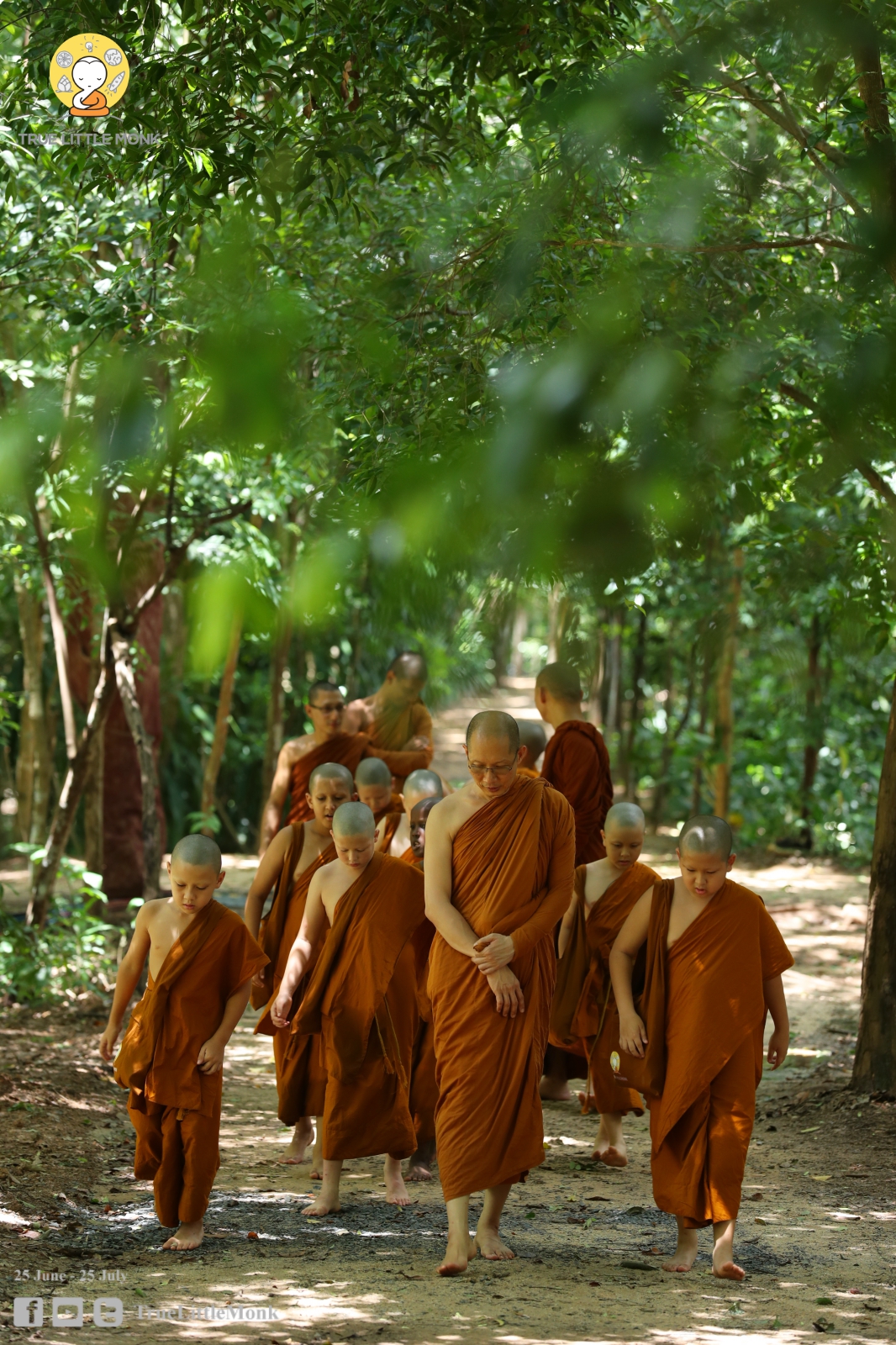A talk by Luang Por Liem instructing two members of the Wat Pah Nanachat community going forth into monastic life becoming a novice in Wat Nong Pah Pong on Feb. 19th 2003 (2546).
Translated by Ajahn Kevali. Also published in "The Ways of the Peaceful" - Teachings about 'Samana Dhamma', the virtues of a Buddhist Monk" by Luang Por Liem Thitadhammo.

From now on, being novices, it is your duty to correct and develop yourselves. You need to constantly recollect that now you belong to a different group than the householders and the common people in the world. Here, we are leading our lives in order to see the danger and disadvantages of samsara, the round of death and rebirth. It is our obligation to do make the qualities of a "samana" (a peaceful renunciant, a contemplative monastic) arise in us - in the sense of being somebody whose ways of life are peaceful.
We develop peaceful bodily conduct. Our body - each and every part of it - shouldn't be used in the manner of a fool. Our conduct needs to be that of a wise man. That means to have humility, an attitude of respect, and live in a subordinate way, not getting carried away with our sense of self - one can say, guarding one's body. Likewise our speech also needs to be guarded, as it can be the source of all kinds of good and bad things. We need to know how to use speech in a good way. If our speech is grounded in humility, it won't get us into trouble. So in our practice, we need to keep observing ourselves for the sake of protection - in every form, both of our bodily conduct and in our verbal conduct - applying mindfulness and keeping ourselves within the standards of the monastic training.
In this way we won't get into confusion or low and vulgar mind states. Low-mindedness is a trait of worldly beings that are capable of doing all kinds of bad things or behave in degenerate ways. They are following the ways of the unwholesome: anger, desire, greed and delusion or what is called ignorance.
Our becoming samanas should gradually give rise to changes in a good direction. Having taken up the training we will have to practise the lifestyle of one who sees how life can be beneficial. We will have to give great attention to ourselves, developing the qualities of honesty and straight-forwardness in our minds. We should maintain good ethical conduct, and possess hiri, a sense of shame towards doing anything bad.
Having a sense of shame towards committing bad actions will also make us feel cautious and considerate, because we see that bad deeds won't lead to freedom. This quality is called ottappa.
So these are some things to keep in mind when we start training ourselves. We follow the intention to keep virtuous conduct (sila) and develop purity of heart. Sila in fact means purity. It is the intention of loving kindness and friendliness, or the intention to respect the rights of other people, being considerate in whatever one does.
And we should start to relate to our environment in a way that examines and investigates it, for the sake of seeking the truth of reality, saccadhamma. These are some aspects that you need to develop an understanding of and educate yourselves in.
Another aspect is how we use our facilities for communicating and relating to the world. We have got eyes, ears, a nose, a tongue, a sense of touch and a mind. Having eyes, we need to know how to guard them. These eyes we have can give rise to both good and evil. The same is true for the ears, etc. If there is both good and evil, we need the skills to organize and choose the good aspects. For example, if the eye sees something that gives rise to feelings of getting carried away by the power of emotions or sensual desire, we need to know how to control ourselves.

If this comes up, we need to use meditation techniques such as investigating the body. Or we contemplate our experience in terms of feelings as they manifest in terms of the two categories of the worldly Dhammas: wished for and unwished for phenomena. We see them as phenomena that are arising and ceasing. They are merely temporary states of existence, and the qualities of stability and durability can not be found in them.
This is why the Buddha warns us to be cautious and restrained whenever the eye sees a form, the ear hears a sound, the nose smells an odour, the tongue tastes a flavour, the body senses something touching it, or there are thoughts arising in the mind. He advises us to have mindfulness and not be careless, not allowing experiences to come up that we didn't filter wisely. This is another aspect in which you will have to train in as samanas: we constantly need to keep filtering.
Then in our training there is the topic of how to relate to the requisites of a monk (robes, food, dwelling, and medicines) and the necessities of life. Following the example of the enlightened beings, we live as somebody who is content and has few wishes. We walk the safe path of those who dwell in mind states that are beyond the world. The way to practise towards our requisites is: knowing what is enough. If we get only little, that's enough.
If we get a lot, that's enough. Even if we don't get anything at all - that's enough. We develop to become somebody who always has enough. That means, somebody who is happy with whatever comes. In this way in our monastic life worrying about these things won't become an obstacle, and we have all the opportunity to continue with our studies, educating and observing ourselves on and on, relying simply on peace and seclusion.
We rely on all the opportunities already given to us in this lifestyle. We really don't have to bother about anything else. Even concerning the world and society: we don't have to worry. We aren't living in conflict with anybody. We are living for the sake of creating benefits for ourselves and others. When we are not in conflict with others, a quality arises in our mind that makes us become accepted by others. This is our task.
The quality of diligent effort is another aspect of monastic life that makes the experience of perfection manifest in ourselves all by ourselves. Perfection means to be completely mature, ready and prepared. Complete preparedness means that there aren't any problems any more.
This is the case with somebody whose mind is fully enlightened and awake, somebody who has already passed their "shining night of prosperity" (as quoted in the Bhaddekaratta Sutta) where there is no more darkness, and there are no more feelings of being oppressed and irritated. A state of being at ease permeates one's mind, and in one's heart one feels fresh and cool.
So we need to apply ourselves diligently to our tasks. This is called practice, investigating, giving very much importance to our lives. A chance like this is very rare. Our lives are really short. We don't have all that much time. The Buddha compared us to dewdrops being dried out by the sun, or to cattle being pulled to slaughter. It really is like this. Time keeps passing, but it doesn't just merely pass. The facts of nature that our bodily form keeps deteriorating makes itself known accordingly with every period of time that has passed. It is possible that the hair on top of our head starts falling out, or our teeth that had once been strong, start to become loose. Our eyesight that used to be clear and bright may become feeble, and our ears that had once been able to hear well and clearly may not even be able to locate from where the sounds are coming any more. Sometimes a noise comes from the north, but we turn our head to the south. We will be making more and more mistakes.
As life passes, our behaviour will undergo changes, so we need to understand these processes of life. We have to be aware that time passes and see the value of changing ourselves towards living in the experience of a pure and peaceful mind, unconfused and with a heart at ease.
Living without confusion is all we need for being at ease. We can't be well when there is chaos. When the powers of defilements and desires are burning us we become heated up and can't find any peace. We are taken by force to become slaves of our desires. We always think that something is good or better or the best and will bring us some happiness, but there is no end in sight. So the Buddha taught us to see the danger in thinking this way.
Don't get bound up with taking desires as something positive. They are poison. If we swallow a poisonous substance, it will poison us and we won't feel well. We'll be deeply in trouble and get worked up being burned alive by dukkha. Following our desires will bring us to fall deeply instead of giving us the chance to experience the supreme. We sink into an inferior position, into disastrous situations. This is the opposite of the path of progress in our development. It isn't good.
So, now that you have the opportunity, bring up motivation for the training. Continually. Walk on the path that the Buddha pointed out. This path is what is meant with right practice. Within the Buddha's path lies full perfection: the training in sila, the training of the mind and the training of wisdom. Don't lead your life like they do out in the world. Their lives keep following the stream of delusion. If pleasant feelings arise, they are happy about it.
If unpleasant feelings arise, they become sad, so they eagerly pursue the pleasant feelings and hate the unpleasant ones or try to do away with them. This seems unworthy. Just think about it. We human beings shouldn't get lost in our delusions to such an extent. We should know things better. Then things will be to our advantage.
So, be determined and motivated - all of you - to take up these duties of ours that carry the name "samana". Do this, as if your being a Samana was a chedi, a place of reverence and devotion that is worthy of worship and respect. Keep on fulfilling your duties in this way. Taking this chance to fulfil our tasks, we will be an example and guide to others, somebody who creates benefit and useful qualities for future times. So let all of us be motivated and determined in our hearts and minds. May every one of us fulfil these duties of a samana in a complete and perfect way.
